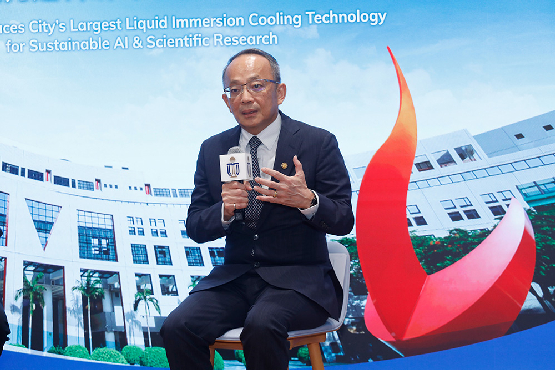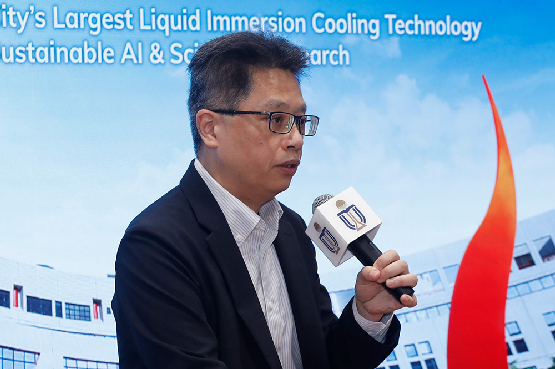


To meet the surging demand for high-power AI research sustainably, The Hong Kong University of Science and Technology (HKUST) has launched the city’s largest Liquid Immersion Cooling system in its new research computing facility. This new technology reduces energy consumption for cooling by over 80% and creates an optimal operating environment that can enhance computing performance at lower temperature.
High Performance Computing (HPC) is vital for scientific research that involves analyzing vast amounts of data or complex algorithms. However, they consume significant electricity, and excessive heat can hinder their performance.
As a leader in AI research, HKUST has become the first local university to implement liquid immersion cooling in its data center, featuring an initial batch of eight tanks capable of housing up to around 280 CPU and GPU servers for HPC. This immersion cooling technology will also be applied to a new eight-story data center for HPC set to be completed on the HKUST campus in 2026. With a more powerful computing system, a broad spectrum of AI-driven tasks that previously required days to process, for example data analysis for vaccine development, personalized medicine, cancer genomics, and model training in astrophysics and materials science, will now be accomplished in hours.
With the adoption of the new cooling technology, the University anticipates that 900 tons of carbon emissions can be avoided each year, resulting in a 45% reduction of carbon emissions compared to traditional rack-level air cooling. There will be an annual savings of approximately HK$3 million in electricity costs, while achieving over 10% improvement in performance per watt. Additionally, the non-corrosive, biodegradable water coolant has a lifespan exceeding 10 years, further reducing the ecological impact of the infrastructure.
HKUST Vice-President for Research and Development Prof. Tim CHENG said, “As we navigate the era of AI, HKUST is committed to harnessing its capabilities across various sectors while nurturing AI talent. Over the years, our distinguished scholars have made significant strides adopting emerging technologies in fields such as healthcare, education, finance and environmental studies to drive groundbreaking innovations. With ongoing infrastructure upgrades, including this liquid immersion cooling technology and a new data center in development, we aim to create a fertile environment for our faculty and students, empowering them to continually push the boundaries of technology and innovation.”
HKUST has long been a pioneer in AI and innovations. It is the first university in Hong Kong to embrace ChatGPT in teaching and learning, and its Hong Kong Generative AI Research and Development Center (HKGAI) is developing the city’s first locally-trained foundation model in generative AI, supporting both Chinese and English. HKUST’s "Data Science and Artificial Intelligence" program is ranked No. 1 in Hong Kong and 10th worldwide in the QS World University Rankings by Subject 2024. The University currently operates a few high-performance computing clusters to support its community’s AI research and applications, including early risk forecasting of Alzheimer's Disease, medical imaging for cancer surgery and prognosis, and the development of AI chips.
Dr. Samuel KWAN, Director of HKUST’s Information Technology Services Center, remarked, “The liquid immersion cooling technology is an exciting addition following the launch of the state-of-the-art supercomputing facility last year. Many scientific research projects currently utilizing the supercomputing facility have yielded significant research outcomes. In line with its goal of achieving net-zero carbon emissions by 2045, we plan to implement this technology in our new data center, further empowering HKUST researchers to accelerate their work while safeguarding the environment.”
This initiative is supported by the University Grants Committee’s Alterations, Additions, Repairs, and Improvements (AA&I) Program. Unlike traditional rack-level air cooling systems that rely on air conditioning and fans, this innovative technology submerges sophisticated hardware into a specially designed water-like coolant, reducing cooling energy consumption by over 80% and achieving a Power Usage Effectiveness (PUE) below 1.1. In the long run, its efficient heat dissipation effectively extends hardware lifespan and lower operational costs of data centers.
* Power Usage Effectiveness (PUE) is a metric used to determine the energy efficiency of a data center. The closer the PUE is to 1, the more efficient is its usage of energy.
About The Hong Kong University of Science and Technology
The Hong Kong University of Science and Technology (HKUST) (https://hkust.edu.hk/) is a world-class university that excels in driving innovative education, research excellence, and impactful knowledge transfer. With a holistic and interdisciplinary pedagogy approach, HKUST was ranked 3rd in the Times Higher Education’s Young University Rankings 2024, while 12 of its subjects were ranked among the world’s top 50 in the QS World University Rankings by Subject 2024, with "Data Science and Artificial Intelligence" being ranked first in Hong Kong and 10th in the world. Our graduates are highly competitive, consistently ranking among the world’s top 30 most sought-after employees. In terms of research and entrepreneurship, over 80% of our work was rated “internationally excellent” or “world leading” in the latest Research Assessment Exercise 2020 of Hong Kong’s University Grants Committee. As of June 2024, HKUST members have founded 1,747 active start-ups, including 10 Unicorns and 14 exits (IPO or M&A).




|
HKUST Leads Chang'E 8 International Cooperation Project Developing the Multi-Functional Lunar Surface Robot with Mobile Charging Station
|
|
HKUST Scholar Prof. DAI Xi Wins Tan Kah Kee Science Award and Highest Honor of State Natural Science Award
|
|
HKUST Researcher Developed Liquid Metal-Based Electronic Logic Device that Mimics Intelligent Prey-Capture Mechanism of Venus Flytrap New Insight on Embodied Intelligence Inspired by Plant
|